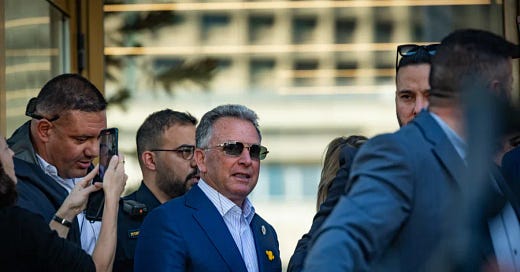The US & Iran will hold a “meeting,” not “negotiation,” in Oman Saturday, State Dept
The US/Iran talks in Muscat on Saturday are to determine “what’s possible in the conversations,” State Department spokesperson Tammy Bruce said April 8.
President Trump’s Middle East envoy Steve Witkoff and Iranian Foreign Minister Abbas Araghchi will hold a meeting hosted by the Persian Gulf nation of Oman on Saturday, not a formal negotiation, to determine what’s possible going forward, the State Department said today.
“This is a meeting that’s happening on Saturday,” State Department spokesperson Tammy Bruce told journalists at the Department briefing today (April 8).
“This is not a negotiation,” Bruce said. “There aren’t things being negotiated in that regard. This has been described to me as something that is a matter of determining what’s possible in the conversations. It’s a touchback, and that’s the extent of what will be happening.”
Iran and the Trump administration have been seeking to clarify what the terms of negotiations might look like, said Iran expert Ali Vaez.
“Trump and Tehran have thus far been in negotiations about what negotiations might look like,” Vaez, director of the Iran program at the International Crisis Group, said. “If the direct engagement President Trump referred to goes ahead, it’s an important step for the two sides to talk with each other instead of past each other.”
The Iranians are likely to be pleased that the Trump administration is sending trusted Trump confidante Witkoff to the talks, said Trita Parsi, vice president of the Quincy Institute.
The Iranians have “been seeking a direct channel to Trump that is trustworthy and that cannot be sabotaged by the neocons, and Witkoff is the guy,” Parsi said.
The meeting comes amid a debate in Washington circles about what the terms of an acceptable new Iran nuclear deal would be. Israeli Prime Minister Benjamin Netanyahu and some pro-Israel hawks have been pushing a maximalist, so-called “Libya” model for a new Iran nuclear deal, which would require Iran to entirely dismantle its nuclear energy program (and which in Libya’s case, later led to international intervention to help topple the Libyan dictator Moammar Qaddafi), a model the Iranians consider a non-starter.
“We agree that Iran must not have nuclear weapons,” Israeli Prime Minister Benjamin Netanyahu said in a video today following his meeting with Trump at the White House on Monday. “This can be achieved through an agreement, but only if that agreement is like the Libya model—where one enters, blows up the facilities, dismantles all the equipment, under American supervision and execution.”
But Trump and Witkoff have discussed a narrower deal that would verify that Iran does not pursue a nuclear weapon, which is something Iranian officials could agree to.
Witkoff “has been talking about the verification-based model, which is pretty much the opposite of the Libya model,” Parsi said. “Everyone knows what happened to Qaddafi, right? Talking about the Libya model is…dead before arrival.”
“There are two types of people who refer to the Libya model in the Iran context: People who haven't paid attention over the last 20+ years, and people who argue for a policy with no chance of success - while ruling out all others - precisely because it has no chance of success,” the Crisis Group’s Vaez wrote on Twitter today.
The State Department’s Bruce left ambiguity in what the US was seeking from a possible new deal with Iran.
“Well, again, I'm not going to get ahead of any kind of conversation,” she said. “Certainly I can't get ahead of a negotiation, because this isn't one.”
“The very specific thing that needs to be accomplished, which would make the world a much safer place, is to make sure that Iran never gets a nuclear weapon,” Bruce said. “And that is something worthy of focusing on at this moment.”
“We are willing to clarify our peaceful intent and take the necessary measures to allay any possible concern,” Iranian Foreign Minister Abbas Araghchi wrote in an oped published by the Washington Post today. “For its part, the United States can show that it is serious about diplomacy by showing that it will stick to any deal that it makes. If we are shown respect, we will reciprocate it.”
Direct or Indirect talks: maybe both
As for Iran saying the talks in Oman Saturday will be “indirect,” and Trump saying they will be direct, former Iranian ambassador Hossein Mousavian says both can be correct.
“It seems that on Saturday in Oman, Mr. Araghchi, the Iranian Foreign Minister, and Mr. Steve Witkoff, President Trump’s envoy, will initially start the negotiations indirectly, and after an hour or two, if the outcome is positive, Iranian and American representatives will begin direct talks,” Mousavian, now at Princeton University, wrote on Twitter.
“It seems that Washington and Tehran have adopted a wise approach, and there is a chance for an agreement,” he wrote.
The Iranians will only agree to direct talks “if the parameters of the talks are sufficient for them to feel that, okay, this actually can go somewhere,” Parsi said. “And that this is not just going to be used as a pretext to go to war.”
(Photo: U.S. Special Envoy to the Middle East Steve Witkoff visited hostage square in Tel Aviv, Israel on January 30, 2025. Photo by Yonatan Sindel/Flash90).
**



